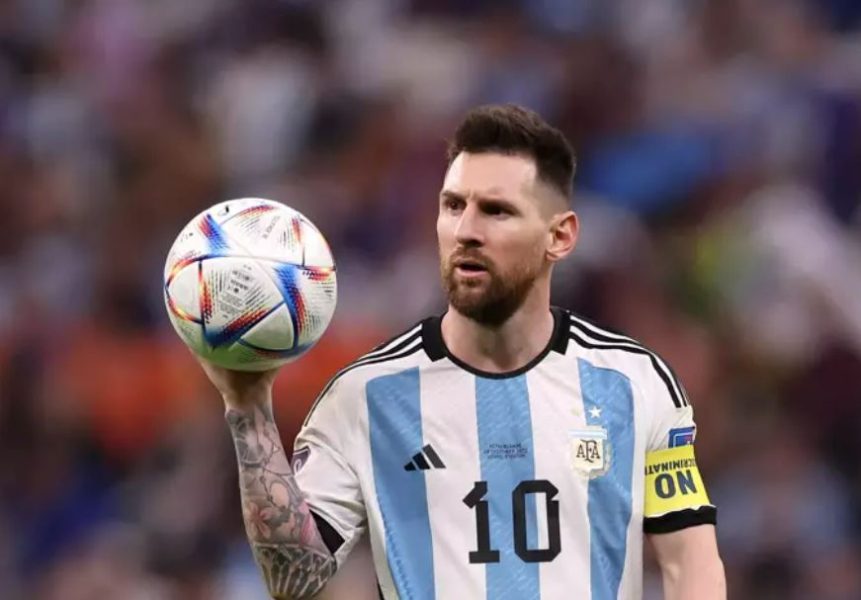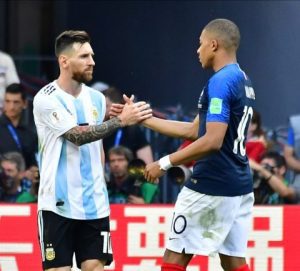
Messi has defied football’s lexicon, and its restrictive grammar
For all the years that he has been playing, Messi has worked against the conventional athleticism of modern football, with the hindsight of poetry and philosophy

After the din and in some euphoric sense, the dust settled on what was possibly the most frantic World Cup final ever, a slight Argentinian took to the podium, cheerful yet composed, a dumb smile pasted to his face. On a night when a ditsy showdown of nerve and audacity blurred all understanding of momentum, there finally emerged a picture of stunning metaphorical clarity. Lionel Messi was coroneted — almost literally with a Qatari ‘bisht’ — in an image that at least visually, proclaimed him as the one true King.
Opinion: Stadiums fall silent after football binge, but has Qatar scored a political goal?
Numbers fell into place, the jigsaw was complete and Messi had finally lifted the trophy that many counted against his claim to being the best ever. And even though his numbers beggar belief, they do undermine the player’s actual worth, the fact that like all timeless art, he can only really be experienced and never quantified. In fact, for all the years that he has been playing, Messi has worked against the conventional athleticism of modern football, with the hindsight of poetry and philosophy. To the extent that he has not only defied football’s lexicon, but also its stringent and restrictive grammar.
Impossible pass
Messi scored two goals in the final. His final penalty, a nerveless little pass into the net, toyed with the France captain and keeper, Hugo Lloris, giving him enough time to think of what could have been. But while number crunchers and statisticians will recoup from the sundry details of a match lived on the edge of chaos, mere numbers, it was something else that Messi did on the night, that underlines what makes him the greatest footballing artist of all time. Argentina’s second goal, a dizzying move of one-touch wizardry, landed at Messi’s feet with three men closing in.
Also read: FIFA World Cup awards, prize money: Golden Boot, Golden Ball, other winners
A conventional side-foot pass to the marauding Mac Allister on his right would have sufficed. It’s what most professional footballers are trained or more so, capable of doing. But Messi had by then imagined the bigger picture and came up with the most precise and subtle of brushstrokes to anchor a counter-attacking masterpiece; a volleyed pass on his blindside that no one could anticipate, let alone attempt. Even Julian Alvarez, who received it, for a microsecond looked surprised.

For anyone who has played some football, regardless of the level, this kind of visualisation is unique. It’s an artistic view of a morosely square canvas otherwise dictated by physical specimens who, the faces notwithstanding, look and function similarly. Everyone on that counter-attack played their municipal part, but the most difficult, the most artistic of it was executed by that featherweight of a man who has bent footballing discourse to his methods, or maybe even the lack of. As much as you can’t set create a strategy against Messi, you possibly, with all due respect to the Argentina coach Lionel Scaloni, can’t create a strategy for him. You simply give him the ball!
Watch: Messi’s World Cup records
While most men around him have grown to resemble bulky, wide-chested mechanics, operatively cumbersomely applying themselves to a certain part of the machine, Messi has walked around, strolled across pitches; often harried, sometimes beat, but fully keyed into the footballing cosmos developing around him. To which effect, the second greatest moment Messi produced in this tournament wasn’t a goal or the twisty run that floored the best young defender of this World Cup edition (Croatia’s Gvardiol) but the impossible pass he played to the right-back Molina for Albiceleste’s first against the Netherlands.
It’s the kind of pass that possibly only a handful of other footballers can see but for them it’s their only source of sporting dividend. They live for the constantly changing architecture of the football pitch, its dynamic dissolution from mass to space and back to mass again. Belgium’s Kevin De Bruyne is an example, but then De Bruyne can’t do the carefree penalty, nor can he spin people on their heels or make that bafflingly perfect past on the half volley in the final, when everyone else, including your teammates think you will go the other way.
Messi vs Ronaldo
In terms of pure numbers, Messi now has the beating of Cristiano Ronaldo, the man he has almost sinfully been compared to. Ronaldo is a beastly machine, a perfectly calibrated mix of ornament and function, of spectacular athleticism and mind-numbing ego. Ronaldo has always wanted to be on the end of things, the one kicking the ball into the net, the one to take in the adulation because the outcome is what impresses his idea of football; as someone obsessed with winning the battle of ‘winning’. But Ronaldo has evidently also, stretched and pulled every sinew of his body, leaped higher than most and run further than anyone to get to a place where he can be compared to someone who defies belief, by existing in an age of metronomic footballing droids. Almost the anti-athlete.
Also read: Messi inspires Argentina to World Cup win in thrilling final
Thin, lightweight and baby-faced, the world has tried to bully Messi into quitting his thing, and yet he has persisted with the kind of football that doesn’t offer the adrenaline rush of robust athleticism, but the symphonic ebb and flow of a conductor orchestrating his own little narrative in the midst of a rather pedantic dogfight for numbers, goals, ungainly headers, audacious bicycle kicks and explosive interviews with journalists. Messi, quite simply, has floated and if he didn’t pick up the ball and run past a few people every now and then, many might even have believed he was mediocre. But that interpretation is born out of a poor understanding of what’s possibly the most difficult ingredient to figure on a footballing canvas – space.
With time, Messi has adapted his game to not just be the outlet, but also become the vehicle. His best seasons were spent alongside the Spanish midfield duo of Xavi and Iniesta, two footballers who instantly connected, and to an extent lived up to the minimalism of his footballing philosophy. For he doesn’t expend energy, run aimlessly, or exonerate himself of pressure by shooting wildly at goal.
Messi’s greatness can never fully be measured
Instead, Messi ambles around, studying space, the feverish interchanging of players and voids, before a narrative presents itself, ripe and primed to have itself authored by that incredible left foot. There is an unobvious craft to all this, the ability to not only imagine the passing over of the baton, but the ability to imagine an entire narrative of passes, lobs, through balls and that eventual shot on goal. It’s artistry, storytelling, in every sense of the word.
Also read: Messi vs Mbappe: Stats, honours, and more
Messi is rightfully compared to both Pele and compatriot Diego Maradona, generational talents with incredible achievements associated with their names. But while they numerically stack up to an extent, the effect Messi has had on modern football, the sheer defiance of it, in fact, fortifies his crown. This is after all the age of muscular, uber-fit male gadgets that have cracked the sport through physical and spiritual alternatives.

One manifested itself in the clearest of forms with a 6-foot-something striker from the Netherlands almost singlehandedly upending a glorious narrative. It’s no wonder then that Messi and Ronaldo’s heirs apparent – France’s Kylian Mbappe and Norway’s Erling Haaland – are gifted with the kind of physicality and pace that feels surreal and frankly unfair. They are, in principle, heirs of Ronaldo alone.
Messi, on the other hand, is indescribable. His greatness stems not from his accomplishments but from moments – like that absurd pass in the final – that are subsequently invisibilised by consumers of prosaic statements as compared to those hungry for the whimsy of poetry. Messi’s artistry lies in the absence of fact, that idea he betrays the conventional rationale of the era he has played in. Nobody can have this good a touch, this level of foresight, or this prophetic a view of a game everyone is playing with the same two eyes. But he is just wired different. He has been devastating for almost 16 years, without ever really having broken a sweat. The greatest artists probably never do. Conception to them is neither a phenomenon nor a conclusive milestone, but simply the waking habit of dabbling with possibilities. Unearthing the unseen. Such art, such greatness can really only be interpreted. It can never be fully measured.
Also read: Pele congratulates Messi, Mbappe after WC final
Also read: Messi ‘suffered’ for many years, says wife


